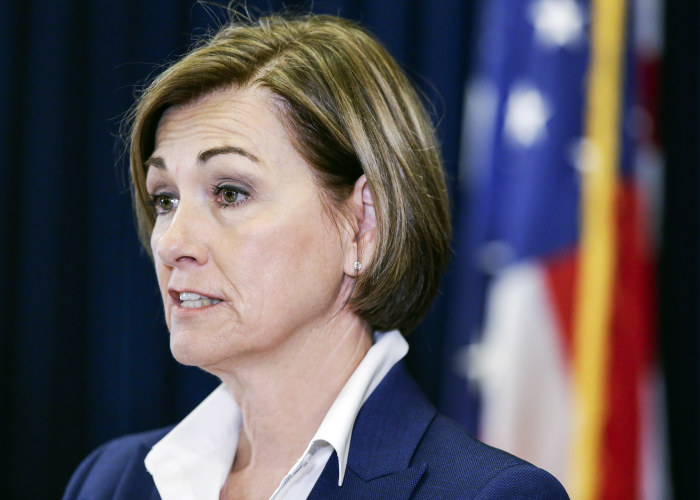Colin Gordon reviews the governor’s recent “business-friendly” decisions and suggests more productive, equitable ways to rebuild Iowa’s economy. -promoted by Laura Belin
The recently-created Governor’s Economic Recovery Advisory Board is charged with drafting a strategy not just to speed recovery from the COVID-19 recession but, as Governor Kim Reynolds charged the board, “to modernize and really restructure our economy, our education and health care systems, our workforce and our quality of life.”
It’s a lofty goal, but first impressions do not inspire confidence.
Consider the makeup of the 13-member board: nine CEOs or business owners, one corporate counsel, one Chamber of Commerce vice-president, one corporate board member, and one factory manager.
That’s right. On a committee charged with reinventing the Iowa economy, there is not a single voice in the room representing Iowa’s working families, the labor movement, the public sector, or higher education. This is a recipe for more of the same, a shortsighted pursuit of “business-friendly” policies that dampen wages and impoverish public goods and services.
Or consider the governor’s recent decision with respect to the state’s $1.25 billion allotment of federal aid from the Coronavirus Relief Fund — which was to dump $490 million, nearly 40 percent of the total, into the state’s unemployment insurance trust fund.
There was no reason to use COVID-19 relief funds for that purpose, which simply protects employers from any increase in unemployment insurance taxes. The federal share of such taxes funds a built-in system of low-interest federal loans for that purpose. Most other states are taking that route.
Brushing past all of the state’s other pressing needs — education funding, local government finances, rent and mortgage relief, food insecurity, unpaid utility bills — the governor instead chose, as she put it bluntly, to use nearly all remaining funds “to minimize the pandemic’s impact on employers.”
If the goal of the Governor’s Advisory Board is — as its chair claims — to “make Iowa one of the best places to live, work, and raise a family,” we are off to a rocky start. An honest assessment of the Iowa economy, and the experience of the last few months, suggest a range of more productive and more equitable options.
First, we need to address the policy gaps and weaknesses exposed by the pandemic itself. Our system of occupational health and safety is fundamentally flawed, a fact underscored by the rolling viral outbreaks at Iowa’s packing plants. The last legislative session acknowledged this in a backhanded fashion — by granting business immunity from liability for workers or customers contracting the virus.
The right lesson from this experience, of course, would be to protect the workers, their families, and their communities through better — and enforceable — standards of workplace health and safety, and the resources necessary to let Iowa’s occupational health and safety inspectors do their jobs.
Second, we need to modernize our unemployment insurance system — both to ensure that it reaches more of the workforce, and to ensure that — when a crisis hits — it has the capacity to process claims quickly and efficiently. The federal “Pandemic Unemployment Assistance” program for workers not normally eligible for unemployment benefits papers over a major weakness of our existing system, where conventional or “contingent” work arrangements are more and more common. We can follow the lead of other states to minimize the misclassification of workers as “independent contractors” and expand access to the protection offered by unemployment insurance.
And third, we need to follow through on the “paid leave” provisions of the Families First and CARES Acts. Given patterns of labor force participation in Iowa families, and the risk posed by COVID-19, it is vital that we follow the lead of other states and institute a program of paid family and medical leave. Such policies allow workers to meet family obligations, in response to personal or public health emergencies, without dropping out of the labor market. Research shows that such policies — at very little cost — benefit employers and employees alike.
In turn, we need to return to our attention to unfinished business of our pre-COVID economy. Iowa cannot live up to the promise of a good place “to live, work, and raise a family” without addressing its persistently low wages. The first step here would be to follow the lead of all but a handful of other states and raise the minimum wage for the first time in over a decade. An increase to $15.00 an hour by 2024 would lift the fortunes of over a third of Iowa’s working families. And the impact would be even more dramatic if it were accompanied by more generous work supports, including child care assistance and an expanded Earned Income Tax Credit.
The keystone of both economic opportunity and economic development is public education, and yet we have persistently failed to provide adequate funding for K-12 education, and cut deeply into support for higher education. The situation here will only worsen — without significant state investments — once the full fiscal impact of the COVID-19 recession is felt.
And finally, the disparate racial impact of both the virus and its attendant recession — and the civil rights organizing in the wake of George Floyd’s death at the hands of the police in Minneapolis — remind us of the work we have to do to ensure equitable social and economic opportunities for all Iowans. Workers of color in Iowa (and across the upper Midwest) have borne the brunt of stagnating wages, attacks on collective bargaining, and slipping investments in public education — even as they have been disproportionately targeted by the police and the justice system. As we rebuild the policies that sustain economic opportunity and outcome, we need to also attend to the historic disadvantages and discrimination that have persisted for too long.
These are challenging times. Our plan for recovery demands more than just a rush back to normal, featuring tax breaks and regulatory relief for business and the thin promise of trickle-down benefits for the rest of us. Our political attention and resources should be targeted where the need is greatest — at those held back by a long history of systemic racism, at those struggling to make ends meet even before the current crisis, and at those hit hardest by the COVID recession.
Colin Gordon is a professor of history at the University of Iowa and is senior research consultant at the nonpartisan Iowa Policy Project in Iowa City.
Top image: Governor Kim Reynolds at her June 4, 2020 news conference. Photo by Jim Slosariek/Cedar Rapids Gazette (pool).


